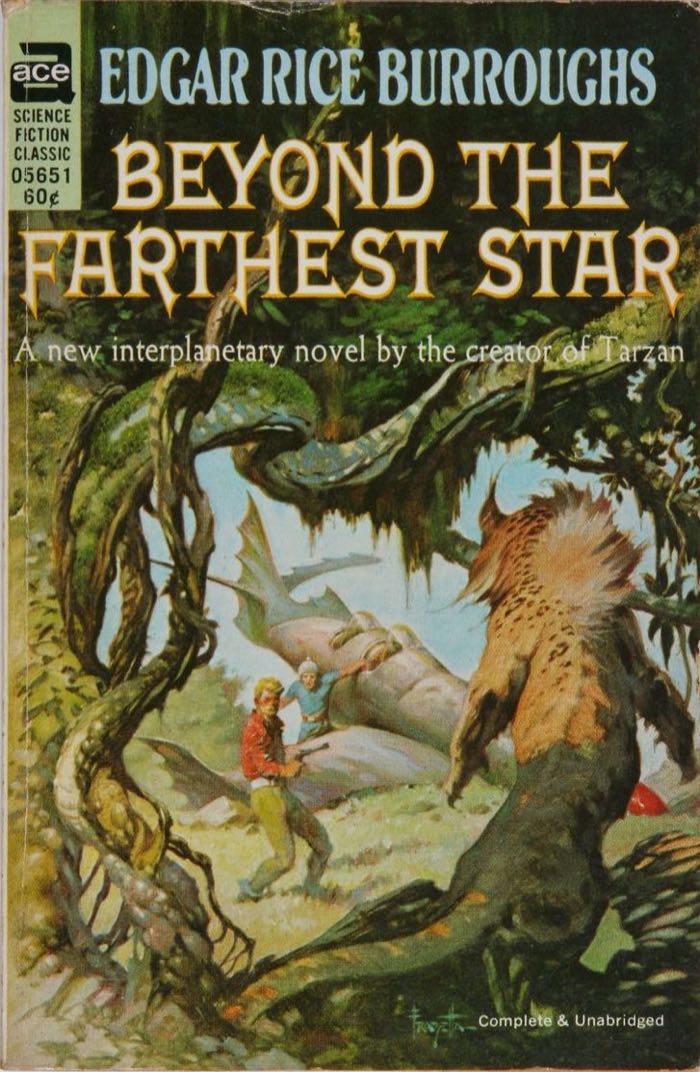Beyond the Farthest Star
Reviewed date: 2009 Mar 16
Rating: 2
158 pages
Adventure On Poloda
The narrator is shot down over German lines in 1939. He awakes to find himself in a verdant world; he is immediately captured by men wearing form-fitted sequined robes. His jailer teaches him the local language and explains that he is on the planet Poloda, in the capital city of the nation of Unis. Poloda is 450,000 light years from Earth. How he arrived on Poloda no one can explain. Our unnamed narrator takes the name Tangor, meaning "from nothing", since he appeared out of nothing. The nation of Unis is at perpetual war with the rival nation of Kapara, so Tangor is put on trial for being a Kaparan spy. He convinces the judges he is no Kapar. Tangor is granted citizenship. Since he was a pilot back on Earth, Tangor eventually secures a position as a flyer in the Unisan fighting service.
Tangor doesn't do anything particularly compelling in the battles he participates in. He manages to stay alive against all odds, which is pretty amazing considering that these dogfights consist of, oh, ten to twenty thousand aircraft on each side. Their fighting altitude is 12 miles, which is about the cruising altitude of the U2 spyplane. Pretty good for prop planes! Their ceiling is about 15 miles, because the planes are unpressurized and that's the point at where the air becomes too thin. At one point the narrator mentions that the atmosphere goes up 100 miles; later he explains further. The planet Poloda and ten sister planets all share the same orbit. They orbit within a gas torus, which should enable easy interplanetary travel. It's like Larry Niven's Smoke Ring except with planets.
Tangor shoots down plenty of Kaparan aircraft, which are inferior to Unisan planes. He crashes in Punos, an area controlled by Kapara but inhabited by a people who hate the Kapars. The Punosans help Tangor fix his airplane, and he escapes back to Unis.
"Planes!" said Yamoda's mother bitterly. "Planes! The curse of the world. History tells us that when they were first perfected and men first flew in the air over Poloda, there was great rejoicing, and the men who perfected them were heaped with honours. They were to bring the peoples of the world closer together. They were to break down international barriers of fear and suspicion. They were to revolutionize society by bringing all people together, to make a better and happier world in which to live. Through them civilization was to be advanced hundreds of years; and what have they done? They have blasted civilization from nine-tenths of Poloda and stopped its advance in the other tenth. They have destroyed a hundred thousand cities and millions of people, and they have driven those who have survived underground, to live the lives of burrowing rodents. Planes! The curse of all times. I hate them. They have taken thirteen of my sons, and now they have taken my daughter."
Tangor Returns
Like the previous story, except Tangor goes on an undercover mission to Kapara. His job is to steal plans for a top-secret project: an interplanetary aircraft. Burroughs repeatedly beats the reader over the head with examples of how horrible Kapara is. Everyone lives in fear of the secret police. Nobody trusts anybody. It's like 1984. Kapara represents the Soviet Union. The Cold War parallels are eerie, considering that Burroughs wrote this before the space race.
Beyond the Farthest Star is out of copyright in Australia but not the United States. You can read it online at Project Gutenberg of Australia.
